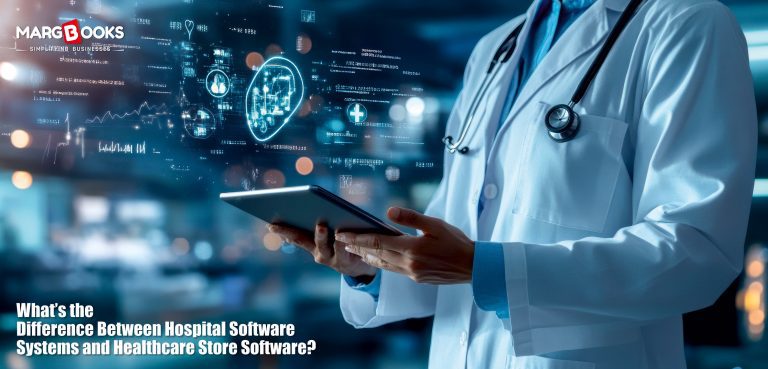When technology plays a major role in streamlining operations, reducing errors, and enhancing patient experience. There’s often a bit of confusion between the types of software used in the healthcare sector. Specifically, people tend to mix up Hospital Software Systems with Healthcare Store Software or Healthcare Shop Software.
While both are essential in their own right, they serve completely different purposes. If you’re in the healthcare industry or planning to step into it, understanding the difference between these two systems can help you make more informed decisions.
Understanding Hospital Software Systems
When we talk about Hospital Software Systems, we’re referring to comprehensive digital platforms used by hospitals, clinics, and healthcare institutions to manage day-to-day activities. These systems handle everything from patient registration and doctor scheduling to billing and diagnostics.
Key Features of Hospital Software Systems:
- Electronic Medical Records (EMR): Securely stores all patient history, reports, prescriptions, and diagnostics in one place.
- OPD & IPD Management: Tracks outpatient and inpatient services, including bed allocation, doctor rounds, and treatment plans.
- Billing and Invoicing: Automated billing for services, tests, consultations, and procedures.
- Pharmacy & Lab Integration: Integrated with in-house pharmacy and laboratories to streamline communication and avoid duplication.
- Appointment Scheduling: Enables both staff and patients to manage appointments efficiently.
- Data Analytics and Reporting: Provides insights into hospital performance, patient care trends, and revenue cycles.
Our hospital software is built with the primary goal of improving patient care, reducing paperwork, and maintaining compliance with healthcare regulations. In India, software such as MargBooks is fast emerging as a go-to choice for hospitals due to its user-friendly interface and scalable modules.
What is Healthcare Store Software?
On the other hand, Healthcare Store Software (also known as Healthcare Shop Software) is used in retail or wholesale medical stores, pharmacies, and chemist shops. This software focuses on inventory management, sales, purchase orders, and GST compliance.
It doesn’t deal with patient records or medical treatments but is essential for ensuring the availability of medicines and supplies, tracking expiry dates, and managing bulk orders.
Key Features of Healthcare Store Software:
- Inventory Management: Tracks stock levels, manages reordering, and monitors product expiry.
- GST Billing: Facilitates accurate billing with GST calculations and returns filing.
- Barcode Scanning: Helps in fast and error-free product billing.
- Purchase & Sales Reports: Gives a clear picture of business performance with daily, weekly, or monthly reports.
- Batch and Expiry Tracking: Crucial for avoiding expired stock and ensuring safety.
- Multi-Store Handling: Ideal for chain pharmacies or medical store franchises.
Software, MargBooks, also offers tailored versions for healthcare stores, providing inventory control and sales tracking in a single dashboard. With features specific to the Indian market’s needs, it’s one of the preferred choices for medical shop owners.
Major Differences Between Hospital Software and Healthcare Store Software
Let’s compare the two to make things even clearer:
| Feature | Hospital Software Systems | Healthcare Store Software |
| Purpose | Patient care & hospital management | Inventory & billing in medical stores |
| Users | Doctors, nurses, hospital admins | Chemists, medical shop owners |
| Key Modules | EMR, IPD/OPD, lab integration, appointments | Billing, stock management, GST filing |
| Data Focus | Patient information, diagnosis, treatment | Product stock, pricing, purchase/sales |
| Integration | Lab, pharmacy, diagnostic tools | Barcode, accounting tools |
| Popular Tool | MargBooks (Hospital version) | MargBooks (Retail/Pharmacy version) |
Why Choosing the Right Software Matters?
Imagine trying to run a hospital using retail software. You’d struggle to manage patient records, and your doctors wouldn’t have access to diagnostic histories. On the flip side, if a medical store used hospital software, it’d be overwhelmed with features it doesn’t need.
Choosing the correct platform ensures:
- Efficiency in operations
- Better compliance with Indian healthcare laws
- Improved customer/patient satisfaction
- Data security and accuracy
Whether you’re managing a 100-bed hospital or a corner medical shop, the right tool makes all the difference.
MargBooks: One Platform, Multiple Solutions
What makes MargBooks stand out is its versatility. Designed with Indian businesses in mind, it offers specialised versions for both hospital management and retail healthcare stores.
- For hospitals, MargBooks provides modules that simplify admissions, patient history tracking, discharge summaries, and more.
- For healthcare shops, MargBooks ensures seamless inventory control, GST invoicing, and batch tracking, helping retailers stay on top of their business.
With cloud access, real-time updates, and user-friendly dashboards, it’s becoming a favourite in both segments.
Final Thoughts
Our Hospital Software Systems and Healthcare Store Software might sound similar, but they cater to very different needs. Hospitals need tools focused on patient care and clinical efficiency, while medical stores need robust inventory and billing management. Tools like MargBooks bridge the gap with specialised solutions for each segment.
If you’re still unsure about what suits your needs best, take a step back, assess your daily operations, and choose software that aligns with your specific requirements. After all, in healthcare, whether clinical or commercial, efficiency is life-saving.



